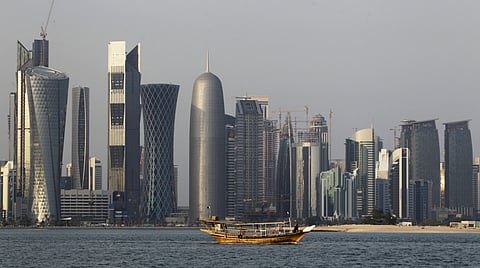Qatar’s arrogance delays crisis resolution
Doha’s belligerent moves have snuffed out recent mediation efforts by the US, Germany and Kuwait

When Qatar’s former emir Shaikh Ahmad Bin Ali Al Thani died during exile in London in November 1977, the Qatari government flew him back to Doha, where he was given a royal funeral by his cousin, Shaikh Khalifa Bin Hamad Al Thani. The same applied to his father, Ali Ibn Abdullah, when he died in Beirut in August 1974. In both cases, three days of mourning were declared by the grandfather of the present emir, who never imagined that he would one day face a similar fate when he too was toppled and spent 10 years of his autumn years in exile in France. He, however, died at a Doha hospital, rather than in Paris, in 2004. Qatari Emir Shaikh Tamim Bin Hamad Al Thani probably imagined that he would one day pay a similar homage to the family of his two predecessors, namely Shaikh Abdullah Bin Ali Al Thani, the brother of Shaikh Ahmad and grandson of Shaikh Ali. The low-profile shaikh has lived abroad for most of his life and was a political nobody until he was given an audience with Saudi King Salman Bin Abdul Aziz last month, mediating a solution to the crisis of Qatari pilgrims at the Haj. He quickly set up his own Twitter account, which three weeks later, has whipped up more than 250,000 followers — many of whom are already hailing him as an “emir-in-waiting”.
ALSO READ:
Instead of thinking about flying him back to Doha for a royal funeral when he dies — as his grandfather did with Shaikh Abdullah’s grandfather — Shaikh Tamim is now probably more worried about what to do with this distant cousin during his own lifetime, as he is clearly being marketed as a possible replacement to the present emir. He is a member of the ruling family, after all, who has not been corrupted by power. Having lived abroad for many years, he is not involved with the wild adventures of Shaikh Tamim and his father, Shaikh Hamad Bin Khalifa Al Thani, and stands at arms-length from Iran, the Muslim Brotherhood, and Al Jazeera. Additionally, both his brother and grandfather were rulers, and Qatar’s independence was obtained during the reign of Ali Ibn Abdullah, giving him further legitimacy.
Arrogance is a cancer
Shaikh Tamim needs to sit back and take a long hard look at how his country has crumbled before his eyes in a dramatically short period since early June this year. Did it have to be like this? Arrogance is a cancer that eats away at the minds of people — destroying the wisest of men since time immemorial. Even in the Arab world, it has taken a heavy toll. Former Egypt president Jamal Abdul Nasser was too arrogant to realise that he was no match for the Israelis in 1967. Former Iraqi president Saddam Hussain realised the same thing in 2003, when he stood up to the Americans and this hubris was repeated by former Libyan strongman Muammar Gaddafi in 2011. Arrogance has also seemingly got the better of the young Qatari emir, who never imagined that it would amount to this — a tiny country oozing natural gas resources and once hailed as a shining market for global investment and entrepreneurship, quarantined today and boycotted by its neighbours for its own malice.
The statements by Shaikh Tamim, published on his government’s official website, were certainly not the reason behind this entire ordeal — but rather it was the trigger as everybody used to say: “Enough is enough.” They have been tolerating Qatar for years, always trying — diplomatically — to change the behaviour of its regime. They tried to do it in private, politely asking Shaikh Tamim to change the editorial policy of Al Jazeera and not to allow open access to the airwaves to notorious politicians from Hamas, or terrorists from Jabhat Al Nusra, such as Abu Mohammad Al Golani — one of the most “wanted” terrorists in the Syrian battlefield. Had Shaikh Tamim bravely said ‘no’, defending his policy as a matter of conviction, then at least the Gulf countries would have considered it as a show of audacity and honesty. Instead, he lied to them — saying one thing in private and doing the exact opposite in public, which seemingly enraged King Salman and his Crown Prince Mohammad Bin Salman — who value a word of honour when given to them. Shaikh Tamim failed to extradite top commanders of Hamas living in Doha or their spiritual leader Yousuf Al Qaradawi, a man considered to be the mentor of both Shaikh Tamim and his father, Shaikh Hamad. His sermons continued to air on Al Jazeera and he was personally received by Shaikh Tamim last Ramadan, with photos distributed by the Qatar News Agency, showing Shaikh Tamim kissing the hand of the controversial Egyptian cleric. Shaikh Tamim refused to distance himself from Iran. Far from it, he turned to the mullahs, seeking food aid and assistance after the crisis erupted, knowing full well how this would resonate with the Saudis and more recently last Thursday, restoring full diplomatic relations with Iran, sending an ambassador to Tehran, after a 20-month absence. Such actions have raised red flags throughout the Gulf.
It is no secret that some in the Gulf still advocate a peaceful solution to the crisis. Many have tried to strike a middle-path with Shaikh Tamim, relying on mediations by the United States, Germany and Kuwait. However, the more Shaikh Tamim snubs the Saudis with his impetuosity, the less powerful these voices will become, until they are muted completely. Looking at the pace of events since early June, it won’t be long before that happens.
Sami Moubayed is a Syrian historian and former Carnegie scholar. He is also author of Under the Black Flag: At the frontier of the New Jihad.


